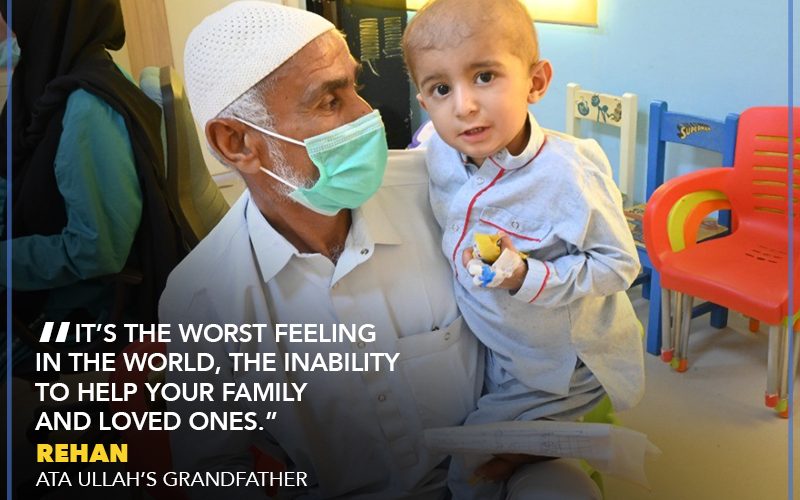THREE GENERATIONS OF LOVE – Ata Ullah
-
by
admin
“He was immobile, and at first, we were terrified he had passed away. We rushed him to a clinic, where they gave him an injection to try and stimulate movement. But unfortunately, he had gone from paralysis to a coma, and we were helpless to do anything. It is the worst feeling in the world, the inability to help your family and loved ones.”
Rehan’s grandson Ata Ullah was an energetic child growing up in Turbat in Balochistan. He would constantly run and play with his siblings and grandparents, whom he adored. But soon after his fourth birthday, his family started noticing that he would tire quickly. Little by little, the once active child became more and more reclusive.
Rehan was worried about his grandson, whose appetite loss and lack of activity stunted his growth. Ata Ullah started losing his ability to move his arms and legs, and the local doctors could not diagnose him properly.
One day they came across him lying still in bed, unresponsive. They rushed him to the hospital, where the doctors gave him an injection. Rehan and his son did not understand what it was for, but it helped Ata Ullah’s breathing as he peacefully slept. However, the doctors informed them that Ata Ullah was in a coma. Initial treatment and diagnosis would cost at least PKR 50,000. The family was in despair, as they could not afford the treatment. They could not bear the thought of possibly losing the young child.
Finding a Lifeline
It was there that a doctor recommended that they take Atta Ullah to The Indus Hospital (TIH), Korangi Campus in Karachi, where he could receive quality treatment completely free. So Rehan and his son, Nisar, undertook the 14-hour journey with Ata Ullah in tow and arrived at TIH to seek medical help. The medical staff immediately placed Ata Ullah in the Intensive Care Unit. He remained comatose for 18 days before regaining consciousness.
Finally, the doctor diagnosed him with blood cancer and asked Rehan and Nisar to stay in Karachi until they completed his treatment. The medical staff was determined to save Ata Ullah’s life, and Rehan and Nisar gladly agreed to stay if it meant saving the boy’s life.
Aftermath and Further Treatment
The doctors have estimated Ata Ullah’s treatment to take two years, and doctors have advised his father and grandfather to remain in Karachi so that he can be under observation. Despite the hardships for the family, the family once again agreed after they saw improvements in Ata Ullah. Although he still has blood cancer and chemotherapy symptoms, Ata Ullah can speak again and fully use both arms. He laughs easily and enjoys playing with his grandfather as Rehan alternates babysitting duties with his son.
“Ata Ullah’s mother is still in our village, as she has to take care of the other children,” Rehan explains. “Even though she misses him and calls every day, she understands that this is the sacrifice we have to make to ensure his survival. I currently reside in Lyari, where TIH assists me with transportation and residence while my son and I switch places between Karachi and Turbat.
“We’ll be spending Eid-ul-Azha in Karachi, away from the family due to the fragility of Ata Ullah’s health. But I have no complaints, and I am thankful that I even have my grandson in my lap. I appreciate and am thankful for all the help from The Indus Hospital, which has given my family a lifeline. I couldn’t imagine living in a world without my grandson, and I cherish every single day I spend with him.”





